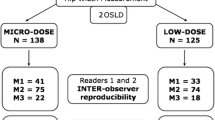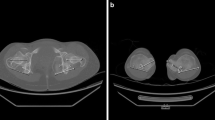Abstract
Objective
To evaluate three-dimensional (3D) measurements of the lower extremity using a biplanar low-dose X-ray device in children and adolescents.
Methods
Firstly, 3D measurements of eight dried bones were analysed by a biplanar low-dose X-ray device (LDX) using stereoscopic software and compared with 3D computed tomography (CT). Secondly, 47 lower limbs of children and adolescents were studied using LDX two-dimensional (2D) and 3D measurements. Both parts were evaluated for femoral and tibial lengths and mechanical angles, frontal and lateral knee angulations, and the femoral neck-shaft angle.
Results
The 3D specimen comparison between LDX and CT measurements showed no significant differences: femoral length (P = 0.069), tibial length (P = 0.059), femoral mechanical angle (P = 0.475), tibial mechanical angle (P = 0.067), frontal knee angulation (P = 0.198), lateral knee angulation (P = 0.646) and femoral neck-shaft angle (P = 0.068). The comparison between LDX 2D and 3D measurements showed significant differences in tibial length (P = 0.003), femoral mechanical angle (P < 0.001) and femoral neck-shaft angle (P = 0.001); other parameters were unremarkable.
Conclusions
The 3D LDX system presented reliable measurements compared with 3D CT. Differences between LDX 2D and 3D measurements were noted in the femoral mechanical angle, femoral neck-shaft angle and tibial length. Moderate to good interobserver agreement for the 3D LDX measurements were found.
Key Points
• Low radiation dose is essential when assessing potential lower extremity discrepancies
• A new biplanar low-dose X-ray device can assess such discrepancies in children/adolescents
• This LDX device provides equally reliable 3D measurements as prevalent practice LDX measurements carry good overall interobserver agreement.



Similar content being viewed by others
References
Gurney B (2002) Leg length discrepancy. Gait Posture 15:195–206
Knutson GA (2005) Anatomic and functional leg-length inequality: a review and recommendation for clinical decision-making. Part I, anatomic leg-length inequality: prevalence, magnitude, effects and clinical significance. Chiropr Osteopat 20;13:11
Shapiro F (1982) Developmental patterns in lower-extremity length discrepancies. J Bone Joint Surg Am 64:639–651
Sabharwal S, Zhao C, McKeon JJ, McClemens E, Edgar M, Behrens F (2006) Computed radiographic measurement of limb-length discrepancy. Full-length standing anteroposterior radiograph compared with scanogram. J Bone Joint Surg Am 88:2243–2251
Reynolds DA (1981) Growth changes in fractured long-bones: a study of 126 children. J Bone Joint Surg Br 63-B(1):83–88
Siffert RS (1987) Lower limb-length discrepancy. J Bone Joint Surg Am 69:1100–1106
Aaron A, Weinstein D, Thickman D, Eilert R (1992) Comparison of orthoroentgenography and computed tomography in the measurement of limb-length discrepancy. J Bone Joint Surg Am 74:897–902
Paley D, Gelman A, Shualy MB, Herzenberg JE (2008) Multiplier method for limb-length prediction in the upper extremity. J Hand Surg Am 33:385–391
Sabharwal S, Kumar A (2008) Methods for assessing leg length discrepancy. Clin Orthop Relat Res 466:2910–2922
Song KM, Halliday SE, Little DG (1997) The effect of limb-length discrepancy on gait. J Bone Joint Surg Am 79:1690–1698
Werlang HZ, Oliveira GA, Tamelini AM, Madalosso BH, Júnior FSM (2007) Escanometria dos membros inferiores: Revisitando Dr. Juan Farill. Radiol Bras 40:137–141
Delialioglu MO, Tasbas BA, Bayrakci K, Daglar B, Kurt M, Agar M et al (2006) Alternative reliable techniques in femoral torsion measurement. J Pediatr Orthop B 15:28–33
Henckel J, Richards R, Lozhkin K, Harris S, y Baena FMR, Barrett ARW et al (2006) Very low-dose computed tomography for planning and outcome measurement in knee replacement. The imperial knee protocol. J Bone Joint Surg Br 88:1513–1518
Aitken AG, Flodmark O, Newman DE, Kilcoyne RF, Shuman WP, Mack LA (1985) Leg length determination by CT digital radiography. AJR Am J Roentgenol 144:613–615
Kogutt MS (1987) Computed radiographic imaging: use in low-dose leg length radiography. AJR Am J Roentgenol 148:1205–1206
Terjesen T, Benum P, Rossvoll I, Svenningsen S, Fløystad Isern AE, Nordbø T (1991) Leg-length discrepancy measured by ultrasonography. Acta Orthop Scand 62:121–124
Liodakis E, Kenawey M, Doxastaki I, Krettek C, Haasper C, Hankemeier S (2011) Upright MRI measurement of mechanical axis and frontal plane alignment as a new technique: a comparative study with weight bearing full length radiographs. Skeletal Radiol 40:885–88919
Dubousset J, Charpak G, Dorion I, Skalli W, Lavaste F, Deguise J et al (2005) A new 2D and 3D imaging approach to musculoskeletal physiology and pathology with low-dose radiation and the standing position: the EOS system. Bull Acad Natl Med 189:287–297
Rousseau M-A, Laporte S, Chavary-Bernier E, Lazennec J-Y, Skalli W (2007) Reproducibility of measuring the shape and three-dimensional position of cervical vertebrae in upright position using the EOS stereoradiography system. Spine 32:2569–2572
Deschênes S, Charron G, Beaudoin G, Labelle H, Dubois J, Miron M-C et al (2010) Diagnostic imaging of spinal deformities: reducing patients radiation dose with a new slot-scanning X-ray imager. Spine 35:989–994
Rillardon L, Campana S, Mitton D, Skalli W, Feydy A (2005) Evaluation of the intervertebral disc spaces with a low dose radiographic system. J Radiol 86:311–319
Azmy C, Guérard S, Bonnet X, Gabrielli F, Skalli W (2010) EOS orthopaedic imaging system to study patellofemoral kinematics: assessment of uncertainty. Orthop Traumatol Surg Res 96:28–36
Chaibi Y, Cresson T, Aubert B, Hausselle J, Neyret P, Hauger O et al (2011) Fast 3D reconstruction of the lower limb using a parametric model and statistical inferences and clinical measurements calculation from biplanar X-rays. Comput Methods Biomech Biomed Engin. doi:10.1080/10255842.2010.540758
Ohl X, Stanchina C, Billuart F, Skalli W (2010) Shoulder bony landmarks location using the EOS low-dose stereoradiography system: a reproducibility study. Surg Radiol Anat 32:153–158
Cooke TDV, Sled EA, Scudamore RA (2007) Frontal plane knee alignment: a call for standardized measurement. J Rheumatol 34:1796–1801
Paley D, Pfeil J (2000) Principles of deformity correction around the knee. Orthopade 29:18–38
Sabharwal S, Zhao C (2009) The hip-knee-ankle angle in children: reference values based on a full-length standing radiograph. J Bone Joint Surg Am 91:2461–2468
Ariumi A, Sato T, Kobayashi K, Koga Y, Omori G, Minato I et al (2010) Three-dimensional lower extremity alignment in the weight-bearing standing position in healthy elderly subjects. J Orthop Sci 15:64–70
Berthonnaud E, Hilmi R, Dimnet J (2009) Personalized models of bones based on radiographic photogrammetry. Surg Radiol Anat 31:461–470
Chauhan SK, Clark GW, Lloyd S, Scott RG, Breidahl W, Sikorski JM (2004) Computer-assisted total knee replacement. A controlled cadaver study using a multi-parameter quantitative CT assessment of alignment (the Perth CT Protocol). J Bone Joint Surg Br 86:818–823
Kadoury S, Cheriet F, Laporte C, Labelle H (2007) A versatile 3D reconstruction system of the spine and pelvis for clinical assessment of spinal deformities. Med Biol Eng Comput 45:591–602
Pomero V, Mitton D, Laporte S, de Guise JA, Skalli W (2004) Fast accurate stereoradiographic 3D-reconstruction of the spine using a combined geometric and statistic model. Clin Biomech (Bristol, Avon) 19:240–247
Schlatterer B, Suedhoff I, Bonnet X, Catonne Y, Maestro M, Skalli W (2009) Skeletal landmarks for TKR implantations: evaluation of their accuracy using EOS imaging acquisition system. Orthop Traumatol Surg Res 95:2–11
Hunt MA, Fowler PJ, Birmingham TB, Jenkyn TR, Giffin JR (2006) Foot rotational effects on radiographic measures of lower limb alignment. Can J Surg 49:401–406
Cooke TDV, Sled EA (2009) Optimizing limb position for measuring knee anatomical axis alignment from standing knee radiographs. J Rheumatol 36:472–477
Goske MJ, Applegate KE, Boylan J, Butler PF, Callahan MJ, Coley BD et al (2008) The image gently campaign: working together to change practice. AJR Am J Roentgenol 190:273–274
Frush DP (2009) Radiation, CT, and children: the simple answer is … it’s complicated. Radiology 252:4–6
Brink JA, Amis ES (2010) Image Wisely: a campaign to increase awareness about adult radiation protection. Radiology 257:601–602
Acknowledgements
This investigation was supported by the National Council for Scientific and Technological Development (CNPq) of Brazil.
Author information
Authors and Affiliations
Corresponding author
Rights and permissions
About this article
Cite this article
Gheno, R., Nectoux, E., Herbaux, B. et al. Three-dimensional measurements of the lower extremity in children and adolescents using a low-dose biplanar X-ray device. Eur Radiol 22, 765–771 (2012). https://doi.org/10.1007/s00330-011-2308-y
Received:
Revised:
Accepted:
Published:
Issue Date:
DOI: https://doi.org/10.1007/s00330-011-2308-y




